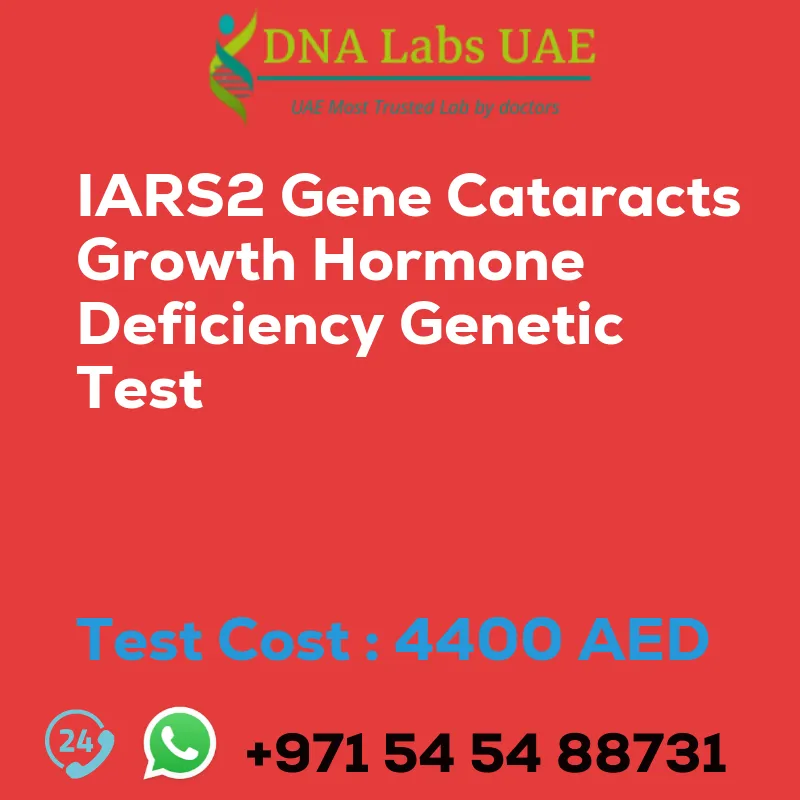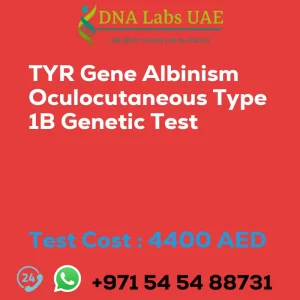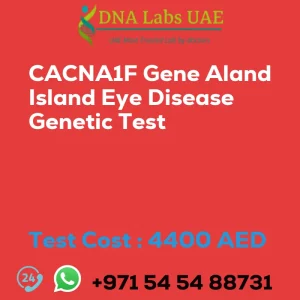IARS2 Gene Cataracts Growth Hormone Deficiency Genetic Test
At DNA Labs UAE, we offer the IARS2 Gene Cataracts Growth Hormone Deficiency Genetic Test for individuals who exhibit symptoms related to cataracts, growth hormone deficiency, sensory neuropathy, sensorineural hearing loss, and skeletal dysplasia. This comprehensive genetic test helps in the diagnosis and understanding of CATSHL syndrome.
Test Details
The IARS2 gene is responsible for encoding the isoleucyl-tRNA synthetase 2 protein, which plays a crucial role in protein synthesis. Mutations in this gene have been linked to CATSHL syndrome. Our NGS (next-generation sequencing) technology enables us to identify mutations in the IARS2 gene by sequencing the entire gene and analyzing any changes or abnormalities in the DNA sequence.
Components and Price
The cost of the IARS2 Gene Cataracts Growth Hormone Deficiency Genetic Test is AED 4400.0. We accept blood samples, extracted DNA, or one drop of blood on an FTA card as sample conditions.
Report Delivery
Once the sample is received, the report will be delivered within 3 to 4 weeks.
Test Type
The IARS2 Gene Cataracts Growth Hormone Deficiency Genetic Test falls under the category of Ophthalmology Disorders. It is recommended for patients with symptoms related to cataracts, growth hormone deficiency, sensory neuropathy, sensorineural hearing loss, and skeletal dysplasia.
Test Department
Our Genetics department is responsible for conducting the IARS2 Gene Cataracts Growth Hormone Deficiency Genetic Test.
Pre Test Information
Prior to the test, we recommend providing the clinical history of the patient who is going for the IARS2 Gene Cataracts Growth Hormone Deficiency Genetic Test. Additionally, a Genetic Counselling session will be conducted to draw a pedigree chart of family members affected by CATSHL syndrome.
Doctor
The IARS2 Gene Cataracts Growth Hormone Deficiency Genetic Test is conducted under the supervision of an Ophthalmologist.
Significance of the Test
Identification of mutations in the IARS2 gene through genetic testing can aid in the diagnosis of CATSHL syndrome. It provides valuable information regarding the prognosis and potential treatment options for affected individuals. Furthermore, genetic testing can help identify carriers of the mutation, allowing for informed family planning decisions.
| Test Name | IARS2 Gene Cataracts growth hormone deficiency Genetic Test |
|---|---|
| Components | |
| Price | 4400.0 AED |
| Sample Condition | Blood or Extracted DNA or One drop Blood on FTA Card |
| Report Delivery | 3 to 4 Weeks |
| Method | NGS Technology |
| Test type | Ophthalmology Disorders |
| Doctor | Ophthalmologist |
| Test Department: | Genetics |
| Pre Test Information | Clinical History of Patient who is going for IARS2 Gene Cataracts, growth hormone deficiency, sensory neuropathy, sensorineural hearing loss, and skeletal dysplasia NGS Genetic DNA Test. A Genetic Counselling session to draw a pedigree chart of family members affected with IARS2 Gene Cataracts, growth hormone deficiency, sensory neuropathy, sensorineural hearing loss, and skeletal dysplasia NGS Genetic DNA Test gene IARS2 |
| Test Details |
The IARS2 gene is responsible for encoding the isoleucyl-tRNA synthetase 2 protein, which plays a crucial role in protein synthesis. Mutations in this gene have been linked to a rare genetic disorder known as cataracts, growth hormone deficiency, sensory neuropathy, sensorineural hearing loss, and skeletal dysplasia (CATSHL) syndrome. NGS (next-generation sequencing) genetic testing can be used to identify mutations in the IARS2 gene. This test involves sequencing the entire gene to identify any changes or abnormalities in the DNA sequence. NGS testing can detect both small and large mutations, including single nucleotide variants, insertions, deletions, and copy number variations. Identification of mutations in the IARS2 gene can help diagnose CATSHL syndrome and provide information on the prognosis and potential treatment options for affected individuals. Genetic testing can also help identify carriers of the mutation and inform family planning decisions. |








